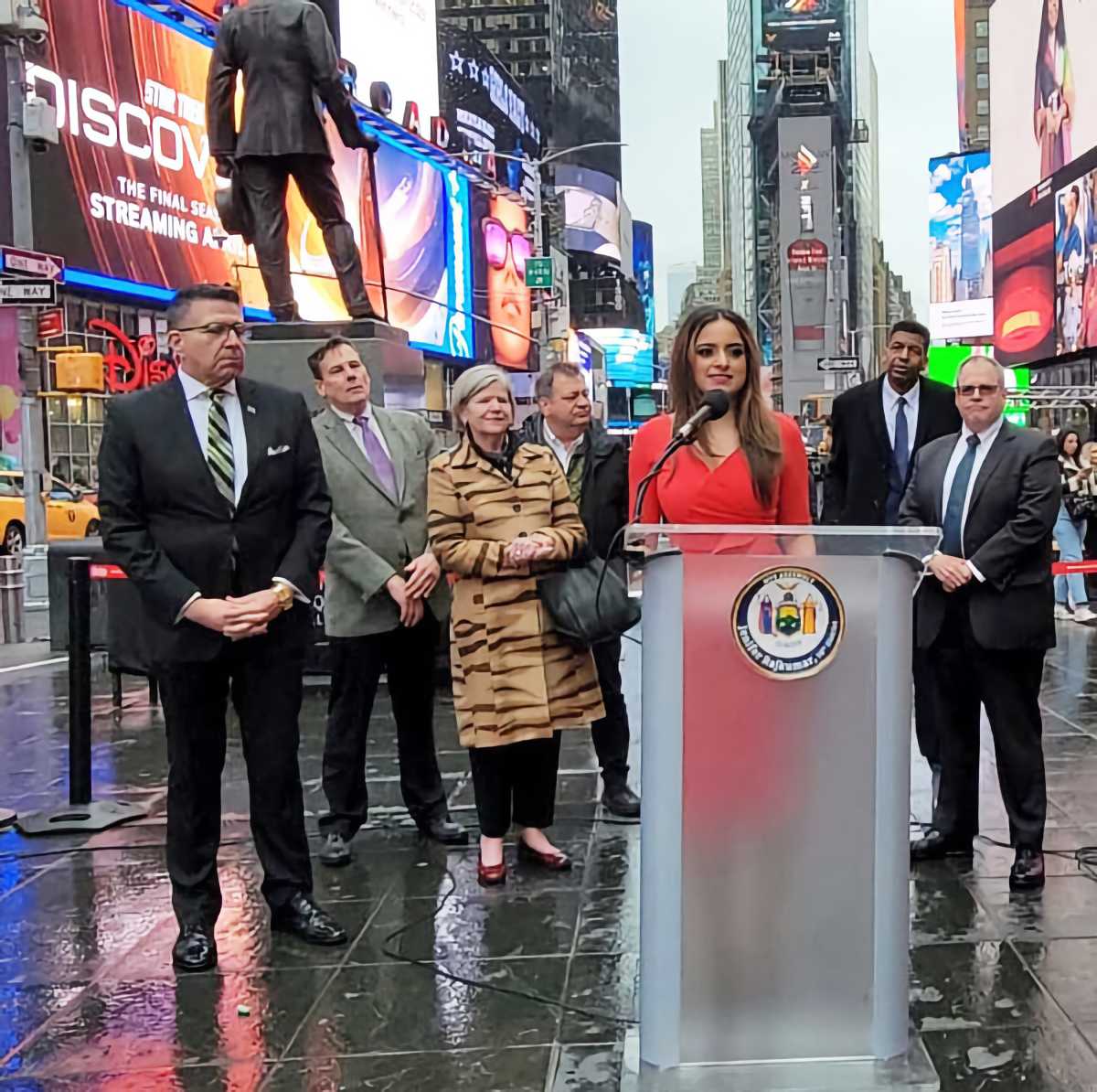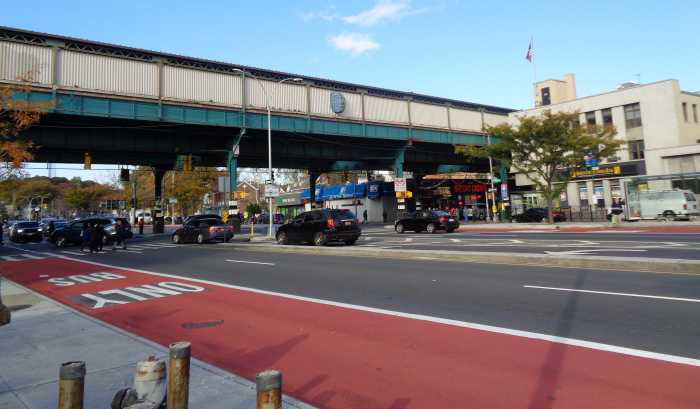Queens Assemblywoman Jenifer Rajkumar recently declared victory as the SMOKEOUT Act passed in the State budget after weeks of negotiations.
The law, which is effective immediately, allows localities across New York to quickly close the approximately 36,000 illegal smoke shops that have ballooned across the state.
“On the first day of the legislative session, I pledged to all New Yorkers that I was going to close down all 36,000 illegal smoke shops ballooning across our state with my SMOKEOUT Act,” said Rajkumar, who represents the 38th Assembly District. “It’s time to smoke ‘em out and shut them down.
“Today is a historic victory for public safety, common sense, and the health of our children,” she added. “The people have spoken, and Albany has listened.”
In the past few months, Rajkumar launched “Operation: SMOKEOUT” that brought New Yorkers together across all five boroughs and backgrounds with the common cause of shutting down these illegal shops.
From Queens, to Harlem, to the Bronx, to Times Square, to City Hall, to Albany, Rajkumar said New Yorkers rallied with her to see SMOKEOUT Act to the finish line.
The SMOKEOUT Act was endorsed by major figures and organizations including New York City Mayor Eric Adams, Sheriff Anthony Miranda, Times Square Alliance, the Partnership for New York City, the East Midtown Partnership, the Cannabis Association of New York, the New York Cannabis Retail Association, the Bodega and Small Business Association, Silent Voices United Inc., and law enforcement across the state.
The next few weeks, Rajkumar said she will be raiding illegal smoke shops across New York City with Sheriff Anthony Miranda, padlocking and shutting them down for good.
Adams had projected that, upon the bill’s passage in the budget, he can close all of the city’s 3,000 illegal smoke shops in 30 days.
The SMOKEOUT Act calls for local control and for the power to shut down shops to be put in the hands of the cities and municipalities.
“New York City and all localities will now have the power to shut down illegal cannabis shops on their own, without waiting for the State Office of Cannabis Management,” Rajkumar said. “In New York City, the Office of the Sheriff will now be able to deputize the NYPD and all agencies to help padlock the shops. This means New York City can use its full manpower to get the job done.”
Additional details of the provisions in the budget include: Localities can padlock a shop immediately provided that the shop is an egregious actor, defined as falling into any one of four categories: Selling cannabis to children; operating next to a school; selling unregulated cannabis; and having the presence of illegal firearms.
Rajkumar said illegal shops that do not fall into one of the above categories can be closed upon a second inspection.
She said any previous inspection conducted before the passage of this law counts for the purpose of padlocking.
Rajkumar said violating a padlock order is now a Class A misdemeanor.
In the interests of fairness, she said there are due process provisions that give violators a chance to cure and be heard.
She said violators can file an appeal within seven days. They are entitled to a hearing on the appeal within three days of filing.
Rajkumar said a decision on the appeal must be rendered four days after the hearing, stating that failure to appeal leads to a default judgment against the violator.
Additionally, she said municipalities outside New York City will have the power to create their own cannabis enforcement schemes by passing new local laws.
Assemblywoman Rebecca A. Seawright said, “We applaud the SMOKEOUT Act’s passage in this year’s budget. Not a day goes by without us hearing about the illegal operations of smoke shops in our neighborhood. Thanks to this legislation, cities can independently close illegal smoke shops that compromise the legal market.”
Tom Harris, President of the Times Square Alliance said, “Nothing kills the buzz of a new business opening like finding out it is selling cannabis illegally and there is little that can be done. We applaud Assemblymember Rajkumar and Governor Hochul for empowering local governments to close down these illegal weed shops so the legal establishments can flourish and grow.”
Francisco Marte of the Bodega and Small Business Association said, “We, the Bodega and Small Business Association, thank Assemblywoman Rajkumar for passing the SMOKEOUT Act. This bill will provide the tools that the Mayor and law enforcement need to shut down the illegal smoke shops selling drugs without any regulations, including to minors. Today is a victory for the health and safety of all our communities. Most of our members are immigrants who came to New York for the American Dream, and because of the Assemblywoman’s fine work we will not have to worry about smoke shops attracting armed robberies or hooking our children on drugs.”
Rajkumar said smoke shops have become a magnet for crime in New York City.
“Filled with valuable contraband and loose cash, they are a tantalizing target for armed robberies,” she said, stating that such robberies skyrocketed from 137 in 2021 to 593 in 2022, or almost 1 robbery for every 2 smoke shops.
In 2023 alone, there were five fatal shootings in smoke shops, including one in Assemblywoman Rajkumar’s district.
Rajkumar said often these unlicensed smoke shops also sell other contraband, including untaxed cigarettes and psychedelics.
She said some offer edibles appealing to children, packaged to resemble sugar cereals and other popular children’s snacks, adding that shops are opening across the street from schools.
Rajkumar said cannabis products from illegal shops even present a danger to the users.
She said a random sampling of illegal smoke shop cannabis products found that 40 percent contained dangerous contaminants such as E. coli, salmonella, lead, and pesticides. She said none met the safety standards of New York’s legal cannabis.
Besides breeding crime and endangering neighborhoods, Rajkumar said illegal smoke shops unfairly compete with the legal cannabis dispensaries authorized by the Cannabis Law of 2021.
“These legal operators underwent a lengthy licensure process and sell rigorously tested and regulated cannabis,” she said. “Legal shops cannot meet the prices of illegal shops’ unregulated cannabis, and there are only 108 legal dispensaries across the state.
“This undermines the legalized cannabis program’s intent to provide economic empowerment to people who were impacted in the past by Draconian drug laws, and to reinvest in communities that were historically targeted for enforcement,” Rajkumar added.






















